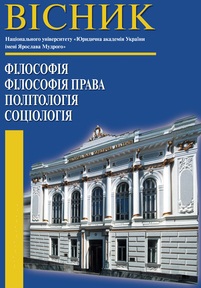СУБ’ЄКТ У ФЕНОМЕНОЛОГІЧНІЙ МОДЕЛІ ПРАВА
SUBJECT IN PHENOMENOLOGICAL MODEL OF LAW
Author(s): Inna Igorivna Kovalenko, Eduard Anatoliyovych Kalnytskyi, Olena LosovaSubject(s): Social Sciences, Philosophy of Law
Published by: Національний юридичний університет імені Ярослава Мудрого
Keywords: non-classical understanding of law; phenomenology of law; legal discourse; legal person
Summary/Abstract: Problem setting. The structure of the legal life phenomenological model, alongside the social experience and legal values, always contains subjective measurements that reflect legal person’s specific features. In particular, the point is in the legal duties, powers and the capability of legal reasoning. Their consideration provides an opportunity to show the integral phenomenological model of law via restored bonds of all its elements, and also enables us to extend the semantic field of social-philosophical aspect of the research through creating theoretical pre-conditions for studying burning issues and specific manifestations of the modern law.Recent research and publications analysis. In phenomenology the person is traditionally recognized as the essential being, while the process of sense generation ensures, inter alia, contextual opportunities to study law. The contemporary experience of the legal person phenomenological understanding may be complemented by the research into the abilities of the legal person as an element of the legal life phenomenological model.Paper aim. This work aims to study the features of the legal person as a structural element of the legal life phenomenological model.Paper results and discussion. The paper shows that the law lifeworld is deeply rooted in social experience. It confirms that owing to the legal person the law lifeworld is constituted and “extended” with interpretations. Its activity as to the given social experience provides grounds to declare the equality of the following modalities: “be the carrier of legal awareness”, “be a legal agent” and “be a recognized and legally protected value”. These theoretical statements enable us to formulate certain social-philosophical issues of legal standing, and outline the ways of their solving. For instance, there is a problem of the symbolic status of a legal entity, found in its relations with the state and citizens; the issue of possible legal person’s recognition as a value in the conditions of his/her minimalized rights and hypertrophy of the legal duties is considered; the nature of a legal conflict and the mechanism of its solution is studied through recognizing the value of various communicative perspectives; it is stated that the differences between the intentional experiences of a legal person and the person with duties are a precondition to form legal nihilism and ignorance.The legal person is also considered in the context of his or her ability to be engaged in the discourse practices, embedded in the mechanisms of interpersonal constitution of senses inherent in the social being. The purpose of the legal discourse in the modern world is defined as a field to identify problems and “tension zones” in the implementation of liberal values and the rule of law. Following the analysis of the approaches to identifying the legal discourse core, its main strategies were discussed: legal discourse is focused on searching and developing socially important topics and sound arguments, confirming positive suggestions for the solving social problems (after J. Habermas); legal discourse implies the use of the power of language to fight against the arbitrary rule, including that of the legitimate power (М. Foucault); the specifics of the legal discourse are in creating linguistic tools and developing the procedures, owing to which legal enforcement is transferred to the speech space (P. Ricoeur).Conclusion. The study showed that the activity of the person who has his or her own legal opinion is in the fact that their generated texts and individual statements are not limited to the formal logical regulations, but are the means of expressing their social experience, the measure of balancing between the person’s claims and his or her social recognition.
Journal: Вісник НЮУ імені Ярослава Мудрого. Серія: Філософія, філософія права, політологія, соціологія
- Issue Year: 42/2019
- Issue No: 3
- Page Range: 107-125
- Page Count: 18
- Language: Ukrainian

